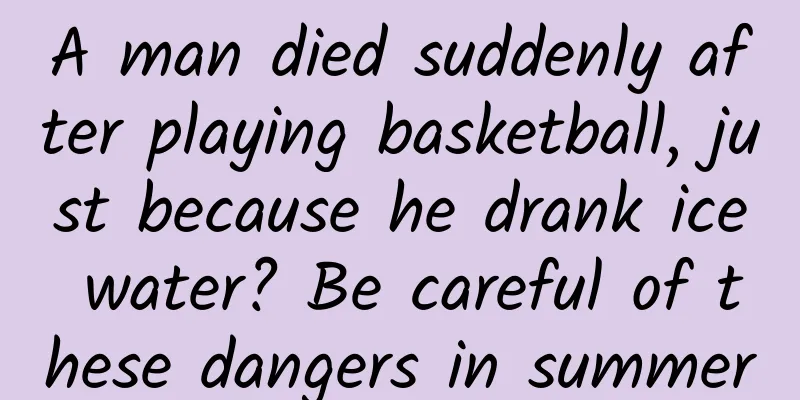A man died suddenly after playing basketball, just because he drank ice water? Be careful of these dangers in summer

|
Expert of this article: Li Siwei, Director of the Rehabilitation Medicine Center of Beijing Jingmei Group General Hospital What do you like to do during the hottest time of summer? Many people like to drink ice drinks at home: Some people train in the coldest days of winter and the hottest days of summer, and they will keep exercising even in very hot weather: Wouldn’t it be nice to drink an icy drink after exercising? Wait! A 24-year-old man in Zhuzhou, Hunan died suddenly after playing basketball outdoors. The outdoor temperature was about 34 degrees Celsius at the time. He drank ice water after playing basketball and slowly fell down 5 minutes later. In addition, there are many news reports online about sudden deaths caused by drinking ice water or ice drinks after summer exercise. It is the hottest time of the year and many people will inevitably need to exercise or work in hot weather. So how can we prevent the tragedy from happening again? Is the culprit of this tragedy "drinking iced drinks"? After reading this article, you will get the answer. Can drinking ice water after exercising in hot weather really cause sudden death? Very likely. The World Health Organization stipulates that sudden death refers to the sudden death of a healthy or seemingly healthy patient due to a natural disease within a short period of time. Sudden death is generally divided into two types: cardiac and non-cardiac. Cardiovascular and cerebrovascular diseases are common causes of sudden death. In hot weather, the evaporation of human sweat increases, the body temperature rises... Various factors cause the heart to work at a high load, and exercise will increase the heart load. Therefore, exercising in a hot environment requires a higher cardiopulmonary reserve capacity, otherwise it will increase the risk of sudden death. So, how did the tragedy of the 24-year-old young man playing basketball mentioned above happen? "Drinking ice water" may indeed be a trigger for sudden cardiac death. Under the premise of high temperature and exercise, the human body is in a state of relatively high body temperature and relatively dilated cardiovascular system. At this moment, if the body is suddenly exposed to excessive ice water, the temperature will drop instantly, which is likely to cause acute stomach cramps and cardiovascular cramps, inducing sudden cardiac death. But in fact, the trigger is just a triggering factor, not the root cause of the tragedy. If the young man had exercised in an air-conditioned indoor venue with a suitable ambient temperature, the heart load after exercise would not have been so great and the tragedy would not have happened. Or if this young man could do proper recovery activities after strenuous exercise to give his heart time to adapt, he might not be knocked down by a small bottle of ice water. Also, his actual cardiopulmonary reserve is still unknown. If he undergoes targeted functional testing in advance and assesses how much exercise his body can withstand before performing corresponding exercise, perhaps he will be fine. There is no "if" in life, only prevention. Therefore, if you want to prevent sudden death, you should not just be alert to the simple act of "drinking ice water", but avoid sports risks from the root. What can increase the risk of sudden death in hot weather? Any behavior that may increase the burden on the heart will significantly increase the risk of sudden death. Among them, the most important is strenuous exercise. During exercise, the oxygen demand of muscle tissue increases. To meet this increased demand, the heart rate increases accordingly, the cardiac output increases, and the heart work increases, the myocardial oxygen consumption also increases, and the heart load increases. Therefore, the more strenuous the exercise, the greater the heart load. In addition, high temperature itself is a predisposing factor for sudden death, so strenuous exercise should be avoided as much as possible under high temperature conditions. If it is unavoidable, you should pay attention to replenishing water and electrolytes, replenishing small amounts of light salt water at room temperature multiple times, and pay attention to ventilation to try to reduce the perceived temperature. How to do sports correctly on hot days? It is best not to completely stop playing sports during the summer. Therefore, we recommend: In summer, exercise should be performed indoors with controlled room temperature. If conditions are limited and outdoor exercise is the only option, we should avoid the hottest period of 9:00-16:00 in summer and try to exercise in the morning and evening when the weather is cool. At the same time, we should choose a cool and ventilated venue. Perform adequate warm-up and recovery exercises before and after exercise. In addition to allowing the heart and lungs to better adapt to the changes in exercise to prevent sudden death, warm-up and recovery exercises can also avoid sports injuries and reduce pain after exercise. Before exercising, you should make a basic assessment of your physical condition. If you have a cold, fatigue, palpitations, dizziness, etc., you can stop exercising that day. During exercise, you should also pay close attention to your physiological state and not try to be strong. If you have obvious shortness of breath, palpitations, dizziness, fatigue, chest tightness, chest pain, difficulty breathing, etc., you should stop exercising immediately and continue to observe. If the symptoms have not been relieved within 5 minutes after stopping exercise, please call 120 immediately to avoid delaying rescue. You should also not relax after exercise. If you experience the above discomfort during the recovery period after exercise, you should also call 120. It is not advisable to cool down immediately after exercise on hot days. Whether drinking ice water, using air conditioning or taking a cold shower, it will quickly take away the body's heat, causing rapid contraction or even spasm of blood vessels, increasing the risk of sudden death. If conditions permit, it is recommended to conduct a cardiopulmonary exercise test before strenuous exercise. In this way, we can know how much intensity of exercise we can tolerate, so as to make scientific plans and arrangements for our own exercise intensity and avoid sudden death to the greatest extent possible. What symptoms should alert you to heart problems? Common symptoms of heart disease generally include chest tightness, shortness of breath, palpitations, chest pain, dizziness, etc. However, the presence of these symptoms does not necessarily mean that it is a heart disease. The above symptoms may also occur during strenuous exercise or excessive fatigue, but they generally do not last long and can be quickly relieved after a certain period of rest. Therefore, if these symptoms worsen after exercise, please be alert to heart problems and seek medical attention as soon as possible. In summary After exercise in hot weather It is best not to drink ice water Try to choose normal temperature salt water or mineral water certainly You can't stop exercising completely in summer Maintain reasonable exercise The best weapon to protect your heart The pictures in this article with the "Science Popularization China" watermark are all from the copyright gallery. The pictures are not authorized for reprinting. |
<<: What infectious diseases should we prevent after a rainstorm? Here comes the answer!
Recommend
What is the reason for women's less urine
If female friends have a little urine, they need ...
Stop saying that children have ADHD, it seems that adults also have it?
Speaking of "ADHD", it sounds like a di...
How does Traditional Chinese Medicine maintain the uterus?
We all know that if a woman loses her fertility, ...
Is the follicular phase a safe period?
Before having sex, both men and women will consid...
What to do if you lose a lot of hair after giving birth
For those mothers who suffer from severe hair los...
Does irregular menstruation affect pregnancy?
In Chinese clinical medicine, there are actually ...
No gestational sac was seen on the second day of medical abortion
After medical abortion, if the gestational sac is...
Avocado is a calorie bomb, so why do so many people eat it to lose weight?
There is a kind of fruit whose reputation is very...
Chronic vaginitis
Vaginitis is a common gynecological disease among...
How to reduce abdominal fat after childbirth
After giving birth, women will generally be fatte...
World Mental Health Day | How to prevent and treat mental illness?
How to prevent and treat mental and psychological...
What is the cause of the pain in the left appendage?
Female friends should pay attention to pain in th...
What's going on when menstruation suddenly decreases?
Irregular menstruation is a gynecological disease...
Is it good to apply hot water to the abdomen during menstruation?
Menstruation is a normal physiological phenomenon...









